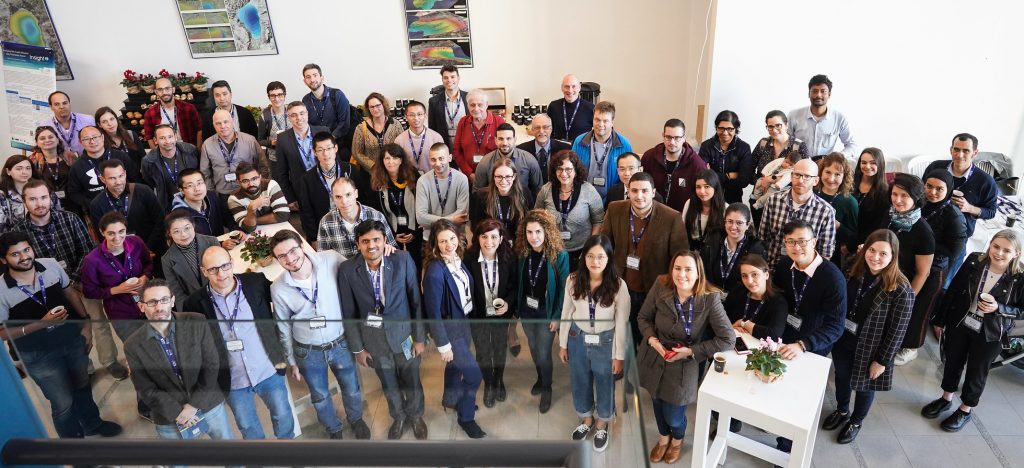Wearable Medical Devices
The Second International Conference on Wearable Devices, which was Held at the Technion, Focused on Chemical Sensors for Monitoring Signs of Illness
The Technion-Israel Institute of Technology held the International Conference on Wearable Devices for Monitoring Health. The lectures during the two-day meeting focused mainly on developing chemical sensors that monitor the user’s medical condition.
The conference was led, for the second year, by the research group of Professor Hossam Haick. An expert in sensor-based medical monitoring, Prof. Haick is the head of the Wolfson Chemical Engineering Nanoscale Device Laboratory, a member of the Russell Berrie Nanotechnology Institute, Assistant to the Senior Vice President for Equal Opportunities, and the Dean of Certification Studies. This year’s conference was organized by members of his research group, Dr. Rotem Vishinkin, Yana Milyutin, Liat Tsuri, and Dr. Yoav Broza.
“Wearable devices for monitoring health has become part of our daily lives,” said Prof. Haick. “We see this in smart watches, monitoring bracelets, and clothing that transfers physiological data. However, developing the sensors that read this data is a slow process that doesn’t keep pace with technological advances on the chemical side. Thus, we decided this year to focus on the sensors and their connection to the electronic components that receive the data.”
At the conference, leading experts from Israel and abroad lectured on a wide range of topics including smart sensing of physiological data; flexible electronic wearables for health monitoring; breath sensors for smartphones; monitoring tuberculosis in the Third World; continuous pain monitoring; a lab-on-skin; paper batteries; and electronic skin that repairs itself.
According to Prof. Haick, “It is important that we do not settle for the presentation of each speaker’s personal achievements but also discuss possibilities for future collaborations among engineers, doctors and scientists – collaborations that are vital for advancing the field.”

The four main plenaries were delivered by the following speakers:
* Prof. Joseph Wang, a Technion graduate who completed all his academic degrees there and is today a professor at the University of California at San Diego. He said “the bottleneck of research and development today is the biochemical stage – the sensing of physiological data. Physical monitoring sensors are exposed to hostile conditions that include heat, sweat, dust, and more, and we expect them to be tiny, sensitive, selective, fast and inexpensive without consuming much energy. This is a very serious challenge, and we cope with it by various means – tattoos for monitoring the skin, micro-needles for diagnosing and introducing materials into the skin, glasses that include sensors, a ring for monitoring the amount of alcohol and cannabis in the blood, and even a pacifier that monitors a baby’s condition.”
* Prof. Howard Katz of Baltimore’s Johns Hopkins University, a specialist in chemical and biomolecular sensors and cancer diagnosis, said: “It is a great honor for me to visit the Technion and collaborate with the Startup Nation. We are engaged in the promotion of personalized medicine based on lightweight, affordable, flexible, and convenient monitoring devices that provide ongoing information on the physiological state of humans at the molecular level.”
* Prof. Sihong Wang of the University of Chicago talked about the potential applications in biological research, health-status monitoring, diagnosis, and treatment. He noted that “technological developments are minimizing the distance between humans and the electronics that serve them. First there was the desktop computer, then the laptop computer, then the smartphone that is in our pockets. But that is just the beginning. Electronics inserted into our bodies will be a revolution in personalized medicine. But along the way, major chemical and physical challenges will have to be overcome. For my research group, the main target right now is a flexible and stretchable electronic system that will get its energy from the body.”
* Prof. Shizuo Tokito of the Research Center for Organic Electrics at Yamagata University in Tokyo, who develops thin, printed transistors for physiological monitoring, spoke about markers in the sweat and ways to monitor them. This is done through integrated, flexible, printed electronic devices attached to the skin and systems that analyze the information through a “cloud.”
Prof. Haick said in summation that the conference aroused positive resonance that will bear fruit in future collaborations between the Technion and other universities and between academia and industry.


